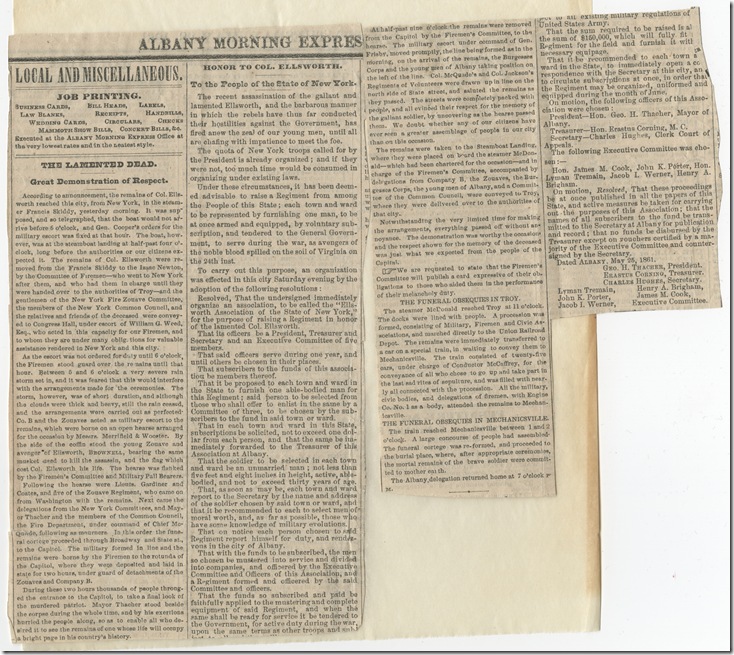Col. Elmer Ellsworth was a lawyer and soldier and friend of Abraham Lincoln who would become one of the first casualties of the Civil War. As a colonel of the Chicago National Guard Cadets before the war, Ellsworth introduced French-inspired Zouave uniforms and drills to the unit. He worked in Lincoln’s law office in August 1860 and assisted him during the fall campaign. After Lincoln’s election he helped organize troops, including the 11th New York Volunteer Infantry Regiment, which was composed of fire fighters. He was shot and killed on May 24, 1861 while removing a large Confederate flag from a tavern in Alexandria, Virginia.
THE LAMENTED DEAD.
Great Demonstration of Respect.
According to announcement, the remains of Col. Ellsworth reached this city, from New York, in the steamer Francis Skiddy, yesterday morning. It was supposed, and so telegraphed, that the boat would not arrive before 6 o’clock, and Gen. Cooper’s orders for the military escort was fixed at that hour. The boat, however, was at the steamboat landing at half-past four o’clock, long before the authorities or our citizens expected it. The remains of Col. Ellsworth were removed from the Francis Skiddy to the Isaac Newton, by the Committee of Fireman-who went to New York after them, and who had them in charge until they were handed over to the authorities of Troy-and the gentlemen of the New York Fire Zouave Committee, the members of the New York Common Council, and the relatives and friends of the deceased were conveyed to Congress Hall, under escort of William G. Weed, Esq., who acted in this capacity for our Firemen, and to whom they are under many obligations for valuable assistance rendered in New York and this city.
As the escort was not ordered for duty until 6 o’clock, the Firemen stood guard over the remains until that hour. Between 5 and 6 o’clock a very sever rain storm set in, and it was feared that this would interfere with the arrangements made for the ceremonies. The storm, however, was of short duration, and although the clouds were thick and heavy, still the rain ceased, and the arrangements were carried out as perfected Co. B and the Zouaves acted as military escort to the remains, which were borne on an open hearse arranged for the occasion by Messrs, Merfield & Wooster. By the side of the coffin stood the young Zouave and avenger of Ellsworth, Brownell, bearing the same musket used to kill the assassin, and the flag which cost Col. Ellsworth his life. The hearse was flanked by the Firemen’s Committee and Military Pall Bearers.
Following the hearse were Lieuts. Gardiner and Coates, and five of the Zouave Regiment, who came on from Washington with the remains. Next came the delegations from the New York Committees, and May or Thacher and the members of the Common Council, the Fire Department, under command of Chief McQuade, following as mourners. In this order the funeral cortege proceeded through Broadway and State st., to the Capitol. The military formed in line and the remains were borne by the Firemen to the rotunda of the Capitol, where they were deposited and laid in the state for two hours, under guard of detachments of the Zouaves and Company B.
During these two hours thousands of people thronged the entrance to the Capitol, to take a final look of the murdered patriot. Mayor Thacher stood beside the corpse during the whole time, and by his exertions hurried the people along, so as to enable all who desired it to see the remains of one whose life will occupy a bright page in his country’s history.
At half –past nine o’clock the remains were removed from the Capitol by the Firemen’s Committee, to the hearse. The military escort under command of Gen. Frisby, moved promptly, the line being formed as in the morning, on the arrival of the remains, the Burgesses Corps and the young men of Albany taking position on the left of the line. Col. McQuade’s and Col. Jackson’s Regiments of Volunteers were drawn up in line on the north side of State street, and saluted the remains as they passed. The streets were completely packed with people, and all evinced their respect for the memory of the gallant soldier, by uncovering as the hearse passed them. We doubt whether any of our citizens have ever seen a great assemblage of people in our city than on this occasion.
The remains were taken to the Steamboat Landing where they were placed on board the steamer McDonald-which had been chartered for the occasion-and in charge of the Firemen’s Committee, accompanied by delegations from Company B, the Zouaves, the Burgesses Corps, the young men of Albany, and Committee of the Common Council, were conveyed to Troy, where they were delivered to authorities of that city
Notwithstanding the very limited time for making the arrangements, everything passed off without annoyance. The demonstration was worthy the occasion and the respect shown for the memory of the deceased was just what we expected from the people of the Capital.
We are requested to state that the Firemen’s Committee will publish a card expressive of their obligations to those who aided them in the performance of their melancholy duty.
Citation: Albany Morning Express.Albany, 28? May 1861. AMs 811/2.8
